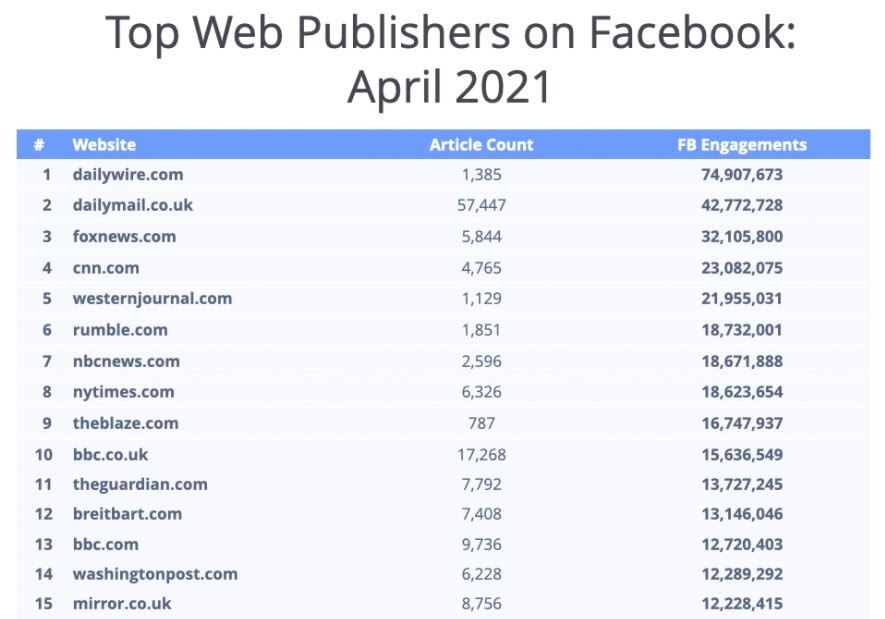Facebook's problem isn't Trump — it's the algorithm
Welcome to Popular Information, a newsletter about politics and power — written by me, Judd Legum. Facebook is in the business of making money. And it's very good at it. In the first three months of 2021, Facebook raked in over $11 billion in profits, almost entirely from displaying targeted advertising to its billions of users. In order to keep the money flowing, Facebook also needs to moderate content. When people use Facebook to livestream a murder, incite a genocide, or plan a white supremacist rally, it is not a good look. But content moderation is a tricky business. This is especially true on Facebook where billions of pieces of content are posted every day. In a lot of cases, it is difficult to determine what content is truly harmful. No matter what you do, someone is unhappy. And it's a distraction from Facebook's core business of selling ads. In 2019, Facebook came up with a solution to offload the most difficult content moderation decisions. The company created the "Oversight Board," a quasi-judicial body that Facebook claims is independent. The Board, stocked with impressive thinkers from around the world, would issue "rulings" about whether certain Facebook content moderation decisions were correct. Facebook executives could spend less time wrestling with thorny content moderation decisions, and more time figuring out how to sell more ads. The most important decision in the Oversight Board's history was issued on Wednesday morning, when the Board reviewed Facebook's decision to indefinitely suspend Donald Trump. The Oversight Board upheld the suspension but said it was inappropriate for Facebook to make it indefinite. It demanded Facebook make a decision on the length of the suspension — or decide to make it permanent. The Oversight Board demonstrated an awareness of how Facebook would like to use Oversight Board decisions to shield itself from controversy. "Facebook seeks to avoid its responsibilities. The Board declines Facebook’s request and insists that Facebook apply and justify a defined penalty," it wrote. But the decision, which is nearly 12,000 words long, illustrates that whether Trump is ultimately allowed to return to Facebook is of limited significance. The more important questions are about the nature of the algorithm that gives people with views like Trump such a powerful voice on Facebook. Those are questions, however, that Facebook is unwilling to answer. The questions Facebook won't answerThe Oversight Board was Facebook's idea. It spent years constructing the organization, selected its chairs, and funded its endowment. But now that the Oversight Board is finally up and running and taking on high-profile cases, Facebook is choosing to ignore questions that the Oversight Board believes are essential to doing its job. This is a key passage (emphasis added):
At another point in the decision, the Oversight Board said it asked for "information about violating content from followers of Mr. Trump’s accounts" and Facebook declined to answer. A critical issue, as the Oversight Board suggests, is not simply Trump's posts but how those kinds of posts are amplified by Facebook's algorithms. Equally important is how Facebook's algorithms amplify false, paranoid, violent, right-wing content from people other than Trump — including those that follow Trump on Facebook. Trump aside, Facebook played a key role in the spreading of misinformation about the election and the organization of the January 6 attack. But Facebook has constructed the Oversight Board to exclude these kinds of discussions. This is how the Oversight Board's charter describes its "authority to review":
The jurisdiction of the Oversight Board excludes both the algorithm and Facebook's business practices. The Oversight Board asked about the algorithm and related issues anyway and Facebook's response was to refuse to answer the questions. Facebook said this information "was not reasonably required for decision-making in accordance with the intent of the Charter." The Oversight Board has no power to compel Facebook to answer. It's an important reminder that, for all the pomp and circumstance, the Oversight Board is not a court. The scope of its authority is limited by Facebook executives' willingness to play along. Facebook's algorithm problem, in one chartDonald Trump's Facebook page is a symptom, not the cause, of the problem. Its algorithm favors low-quality, far-right content. Trump is just one of many beneficiaries. NewsWhip is a social media analytics service which tracks which websites get the most engagement on Facebook. It just released its analysis for April and it shows low-quality right-wing aggregation sites dominate major news organizations. The Daily Wire, for example, is a sexist, xenophobic, and bigoted far-right website that produces no original reporting. But, on Facebook in April, The Daily Wire received more than double the distribution of the Washington Post and the New York Times combined: This actually understates how much better The Daily Wire's content performs on Facebook than the Washington Post and the New York Times. The Daily Wire published just 1,385 pieces of content in April compared to over 6,000 by the Washington Post and the New York Times. Each piece of content The Daily Wire published in April received 54,084 engagements on Facebook, compared to 2,943 for the New York Times and 1,973 for the Washington Post. Two other sites that top the Washington Post and the New York Times are Western Journal, a far-right website that pushed Trump's false claims about voter fraud, and Rumble, a video platform that caters to Trump supporters. It's important to note here that Facebook's algorithm is not reflecting reality — it's creating a reality that doesn't exist anywhere else. In the rest of the world, Western Journal is not more popular than the New York Times, NBC News, the BBC, and the Washington Post. That's only true on Facebook. Facebook has made a conscious decision to surface low-quality content and recognizes its dangers. Shortly after the November election, Facebook temporarily tweaked its algorithm to emphasize "'news ecosystem quality' scores, or N.E.Q., a secret internal ranking it assigns to news publishers based on signals about the quality of their journalism." The purpose was to attempt to cut down on election misinformation being spread on the platform by Trump and his allies. The result was "a spike in visibility for big, mainstream publishers like CNN, The New York Times and NPR, while posts from highly engaged hyperpartisan pages, such as Breitbart and Occupy Democrats, became less visible." BuzzFeed reported that some Facebook staff members wanted to make the change permanent. But that suggestion was opposed by Joel Kaplan, a top Facebook executive and Republican operative who frequently intervenes on behalf of right-wing publishers. The algorithm change was quickly rolled back. Facebook made a similar change after January 6, but only for a few days. Other proposed changes to the Facebook algorithm over the years have been rejected or altered because of their potential negative impact on right-wing sites like The Daily Wire. One day, Trump may be back allowed on Facebook. Or he may not. But as long as the Facebook algorithm continues to favor Trumpism, nothing much will change. Popular Information is fiercely independent and accepts no advertising. This newsletter only exists because of the support of readers like you. |
Older messages
UPDATE: Some corporations break their silence on Texas' voter suppression bills
Wednesday, May 5, 2021
For months, members of the Texas legislature have been considering two bills (SB7 and HB6) that would make it harder to vote — particularly in areas with large Black populations like Harris County. In
The counting will continue until results improve
Tuesday, May 4, 2021
A count of the votes of November's presidential election in Arizona found that Joe Biden defeated Donald Trump by 10458 votes. Republicans immediately zeroed in on Maricopa County, home of Phoenix,
Is your T-shirt a human rights violation?
Monday, May 3, 2021
The next T-shirt you buy could be made from cotton harvested by forced manual labor in the Chinese territory of Xinjiang. The Chinese government has fiercely retaliated against clothing brands and
The radicalization of the Texas GOP
Thursday, April 29, 2021
The locus of political and economic power is shifting in the United States. And it's shifting toward Texas. According to the 2020 Census, Texas gained 4 million residents over the last 10 years and
America's tax cheats
Wednesday, April 28, 2021
On Wednesday evening, Biden will introduce the "American Families Plan," a sweeping proposal that calls for hundreds of billions in spending on "child care, universal prekindergarten,
You Might Also Like
UW and computer science student reach truce in ‘HuskySwap’ spat
Saturday, January 11, 2025
Blue Origin set for first orbital launch | Zillow layoffs | Pandion shutdown | AI in 2025 ADVERTISEMENT GeekWire SPONSOR MESSAGE: GeekWire's special series marks Microsoft's 50th anniversary by
Cryptos Surrender Recent Gains | DOJ's $6.5 Billion Bitcoin Sale
Saturday, January 11, 2025
Bitcoin and other tokens retreated as Fed signaled caution on rate cuts. Forbes START INVESTING • Newsletters • MyForbes Presented by Nina Bambysheva Staff Writer, Forbes Money & Markets Follow me
Just Buy a Balaclava
Saturday, January 11, 2025
Plus: What Raphael Saadiq can't live without. The Strategist Every product is independently selected by editors. If you buy something through our links, New York may earn an affiliate commission.
Up in Flames
Saturday, January 11, 2025
January 11, 2025 The Weekend Reader Required Reading for Political Compulsives 1. Trump Won't Get the Inauguration Day He Wanted The president-elect is annoyed that flags will be half-staff for
YOU LOVE TO SEE IT: Biden’s Grand Finale
Saturday, January 11, 2025
Biden drills down on offshore drilling, credit scores get healthier, social security gets a hand, and sketchy mortgage lenders are locked out. YOU LOVE TO SEE IT: Biden's Grand Finale By Sam Pollak
11 unexpected things you can put in the dishwasher
Saturday, January 11, 2025
(And 7 things you should keep far away from there) View in browser Ad The Recommendation January 11, 2025 Ad 11 things that are surprisingly dishwasher-safe An open dishwasher with a variety of dishes
Weekend Briefing No. 570
Saturday, January 11, 2025
Black Swan Threats in 2025 -- Why Boys Don't Go To College -- US Government's Nuclear Power Play ͏ ͏ ͏ ͏ ͏ ͏ ͏ ͏ ͏ ͏ ͏ ͏ ͏ ͏ ͏ ͏ ͏ ͏ ͏ ͏ ͏ ͏ ͏ ͏ ͏ ͏ ͏ ͏ ͏ ͏ ͏ ͏ ͏ ͏ ͏ ͏ ͏ ͏ ͏ ͏ ͏ ͏ ͏ ͏ ͏ ͏ ͏ ͏
Your new crossword for Saturday Jan 11 ✏️
Saturday, January 11, 2025
View this email in your browser Take a mental break with this week's crosswords: We have six new puzzles teed up for you this week. Play the latest Vox crossword right here, and find all of our new
Firefighters Make Progress, Water Rankings, and Ohio St. Wins
Saturday, January 11, 2025
Multiple wildfires continued to burn in Southern California yesterday, with officials reporting at least 10 deaths. Over 10000 homes across 27000 acres have burned, and 20 suspected looters have been
☕ So many jobs
Saturday, January 11, 2025
So why did stocks fall? January 11, 2025 View Online | Sign Up | Shop Morning Brew Presented By Indacloud Good morning. It's National Milk Day, the one day of the year you're allowed to skim



